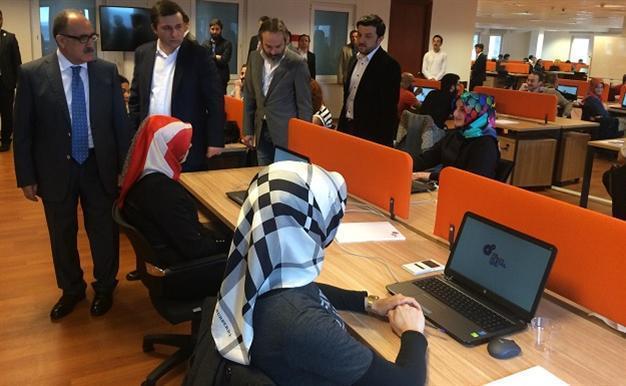Turkey’s ruling AKP fields new ‘digital army’

AKP Deputy Chair and Spokesman Beşir Atalay (L) opened the party’s digital office in Istanbul on May 8. DHA photo
Weeks before the general elections, Turkey’s ruling Justice and Development Party (AKP) has changed its much-criticized digital strategy, replacing its infamous “trolls” with a “regular army” - at least on paper.The AKP’s first comprehensive digital strategy was an aggressive response to the Gezi Park protests in the summer of 2013, in which online media was heavily used by demonstrators.
Out of anger for not being able to have a grip on social media, at least not as tight as it had on traditional media, the party formed a 6,000-strong digital team in September 2013 to forge public opinion on the Internet, too.
The impromptu planning of the AKP’s strategy, however, created a massive, but highly disorganized online force on the ground.
The party had initially mobilized its youth branches around the country for its daily agenda on the web, such as pushing a propaganda hashtag onto Twitter’s worldwide trending topics list.
The digital organization of youth branches was then overseen by Süleyman Soylu, the deputy chair in charge of party organization, and predated the Gezi Park protests. After Gezi, however, the party saw they needed more than this official, regular army to rule the digital world.
Trolls are people, too. Or are they?
Enter “trolls.”
I personally discovered them in October 2013 when I was targeted by a torrent of abuse on Twitter over my article for Hürriyet, which criticized the Turkish government over its handling of a hostage crisis in Lebanon.
Weeks before and after the incident, scores of other journalists were targeted by the same accounts in obviously centralized, orchestrated social media campaigns to silence criticism of the AKP.
Citing phone calls wiretapped during the graft probes of December 2013, Turkish media had reported claims alleging that then prime minister Recep Tayyip Erdoğan’s advisor, Mustafa Varank, was in charge of the trolls, while Erdoğan’s daughter had also asked for their online service at least once. The government, on the other hand, defends that many of these recordings were just “montages.”
Most of the pro-AKP trolls are anonymous social media accounts that routinely propagandize for the AKP, either to promote its agenda or to target its critics - sometimes with insults, expletives and threats. They have fictional names and fake profile photos.
There are also self-proclaimed social media experts, who make a living by preaching conservative values. For their “voluntary” contribution to the AKP’s digital campaigns, the government awarded some of these “real people” with perks, such as letting them have their own shows on Turkey’s public television channel, the TRT, on the payroll of the taxpayers.
‘Eradicating’ Twitter
The post-Gezi pro-AKP digital activities have been heavily relying on botnets, which are collections of Internet-connected programs communicating with other similar programs in order to perform a repetitive task, like tweeting a hashtag at the same time.
The AKP’s allies-turned-nemeses, the Gülenists, and several opposition parties have also been using botnets, but the pro-AKP online campaign was significantly larger, more efficient and more aggressive, with the apparent use of the government’s capacities.
I reported in Hürriyet Daily News on March 20, 2014, that Twitter had removed thousands of bot accounts with “manipulative” motives, regardless of their political affiliation, only days before local elections. Hours after the newspaper was published, the Turkish government blocked access to Twitter, as Erdoğan vowed to “eradicate” the social media network.
Twitter kept removing fake bots and suspending the abusive accounts of the real-but-anonymous pro-AKP trolls, and the ruling party’s digital efficiency has gone into decline as the June 7 general elections approach.
For the AKP, controlling the Internet, which Erdoğan is admittedly “against every day,” eventually became a policy goal. After all, there are 36 million active Facebook users and 11.5 million Twitter users in Turkey, while Internet penetration reached 45 percent of the population as of 2014.
AKP’s digital HQ moved to Istanbul
Last week, AKP Deputy Chair and Spokesman Beşir Atalay told the Ankara representatives of Turkish newspapers that the party had decided its social media activities should be “put in order” before the elections.
Atalay then inaugurated the party’s “New Turkey Digital Office” in Istanbul on May 8, describing it as “an important communication platform that will be useful after the elections, too.”
When asked what they would do about the trolls, Atalay said, “All of our accounts will be officially announced. Our messages will be determined at the party headquarters. None of the other accounts would be related to us, including those ones [trolls].”
So, the AKP’s new digital strategy is replacing its stinging trolls with official propagandists?
It is too early to draw a conclusion, but Turkey’s ruling party might be slowly comprehending a fact that even the Iranian establishment has recently realized:
“With new technologies, news moves quickly and there is no way anyone can stop or control it ... We should take control of the scene and produce content, because we can only control public opinion through the content we produce.”











